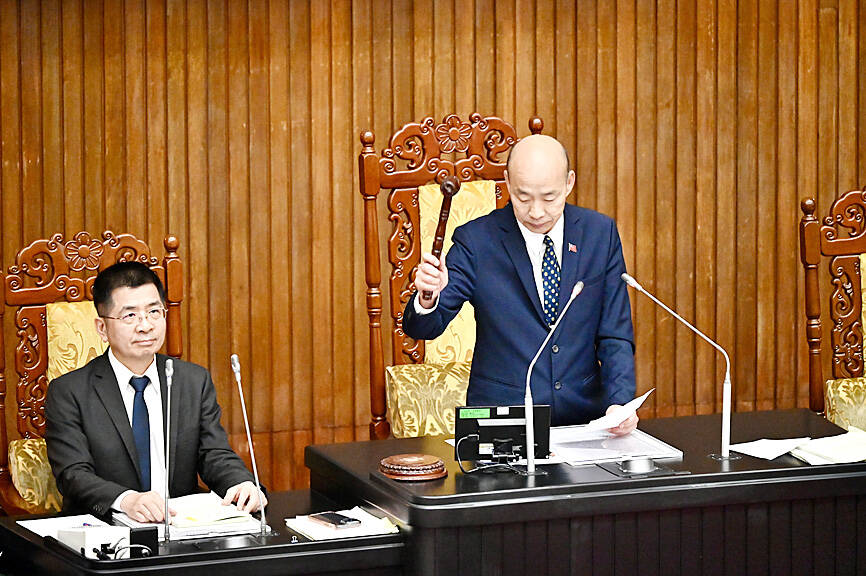The legislature’s passage last week of amendments to the Act for Industrial Innovation (產業創新條例) would help retain crucial technologies at home and promote the adoption of artificial intelligence (AI) and carbon-reduction technologies, the Ministry of Economic Affairs (MOEA) said on Friday.
Under the amendment to the act’s Article 22, companies investing in certain countries, industries or technologies are required to obtain government approval if their investments are above a designated threshold, have a potentially negative impact on national security or economic development, obstruct the government’s ability to abide by international protocols, or contravene labor laws.
Article 22 had previously only required companies making overseas investments of more than NT$1.5 billion (US$45.99 million) to obtain prior approval from the authorities, the ministry said.

Photo: George Tsorng, Taipei Times
Under the new Article 67-3, companies failing to gain prior government approval for investing in designated countries face fines ranging from NT$50,000 to NT$1 million, with repeated contraventions subject to higher fines of between NT$500,000 and NT$10 million, the ministry said.
Previously, the regulation only applied to companies’ investment amount, with investments above the NT$1.5 billion threshold requiring prior approval and those below subject to post-review. The revised rule stipulates that investments in some designated regions and industries also need to gain prior regulatory permission, Department of Investment Reviews Deputy Director-General Su Chi-yen (蘇琪彥) said.
Under the amended Article 10-1, investments in AI and energy-saving projects are eligible for tax deductions, alongside existing categories such as smart machinery, 5G systems and cybersecurity applications, the Industrial Development Administration (IDA) said.
The maximum tax deduction rate for such investments is 5 percent, as the law aims to encourage companies to adopt digital tools such as AI and cloud computing to enhance operational agility and reduce carbon emissions, it added.
In addition, the cap on eligible investments is to be raised from NT$1 billion to NT$2 billion, which means that companies previously only eligible for a maximum tax deduction of NT$50 million could now apply for a deduction of up to NT$100 million, with the incentive remaining effective until the end of 2029, IDA Deputy Director-General Chen Pei-li (陳佩利) said.
To support domestic start-ups, newly amended Article 23-1 lowers the minimum paid-in capital requirement for limited partnership venture capital firms to NT$150 million from NT$300 million, while major shareholders are required to increase their investments in the start-ups from the third year onward to ensure access to funding during the early establishment stage, Chen said.
“We made this decision following the concept of pass-through tax, which is levied only on shareholders rather than on companies, to help ease financial pressure on start-ups,” she added.
Investing in companies designated as national strategic industries are to benefit from a maximum personal income tax deduction of NT$5 million, up from NT$3 million previously, as part of the ministry’s plan to support start-ups, Chen said.

UNCERTAINTY: Innolux activated a stringent supply chain management mechanism, as it did during the COVID-19 pandemic, to ensure optimal inventory levels for customers Flat-panel display makers AUO Corp (友達) and Innolux Corp (群創) yesterday said that about 12 to 20 percent of their display business is at risk of potential US tariffs and that they would relocate production or shipment destinations to mitigate the levies’ effects. US tariffs would have a direct impact of US$200 million on AUO’s revenue, company chairman Paul Peng (彭雙浪) told reporters on the sidelines of the Touch Taiwan trade show in Taipei yesterday. That would make up about 12 percent of the company’s overall revenue. To cope with the tariff uncertainty, AUO plans to allocate its production to manufacturing facilities in

Taiwan will prioritize the development of silicon photonics by taking advantage of its strength in the semiconductor industry to build another shield to protect the local economy, National Development Council (NDC) Minister Paul Liu (劉鏡清) said yesterday. Speaking at a meeting of the legislature’s Economics Committee, Liu said Taiwan already has the artificial intelligence (AI) industry as a shield, after the semiconductor industry, to safeguard the country, and is looking at new unique fields to build more economic shields. While Taiwan will further strengthen its existing shields, over the longer term, the country is determined to focus on such potential segments as

COLLABORATION: Given Taiwan’s key position in global supply chains, the US firm is discussing strategies with local partners and clients to deal with global uncertainties Advanced Micro Devices Inc (AMD) yesterday said it is meeting with local ecosystem partners, including Taiwan Semiconductor Manufacturing Co (TSMC, 台積電), to discuss strategies, including long-term manufacturing, to navigate uncertainties such as US tariffs, as Taiwan occupies an important position in global supply chains. AMD chief executive officer Lisa Su (蘇姿丰) told reporters that Taiwan is an important part of the chip designer’s ecosystem and she is discussing with partners and customers in Taiwan to forge strong collaborations on different areas during this critical period. AMD has just become the first artificial-intelligence (AI) server chip customer of TSMC to utilize its advanced

While China’s leaders use their economic and political might to fight US President Donald Trump’s trade war “to the end,” its army of social media soldiers are embarking on a more humorous campaign online. Trump’s tariff blitz has seen Washington and Beijing impose eye-watering duties on imports from the other, fanning a standoff between the economic superpowers that has sparked global recession fears and sent markets into a tailspin. Trump says his policy is a response to years of being “ripped off” by other countries and aims to bring manufacturing to the US, forcing companies to employ US workers. However, China’s online warriors